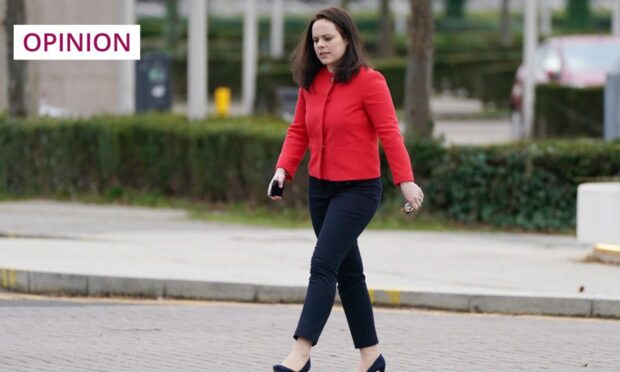The Kate Forbes leadership furore reminds us of an important principle: the necessity of separating church and state, writes Catherine Deveney.
The dance is slow, stylised, each step a deliberate statement. The location is not coincidental: Tehran’s Azadi – meaning “freedom” – Tower.
Amir Mohammad Ahmadi is dressed in jeans. His fiancée, 21-year-old Astiazh Haqiqi, is clad head to toe in black, with wide, flowing trousers and a long jacket but no head scarf, her long hair flying free as he whirls her round. A dance of defiance. But the video, posted online, has earned them 10 years’ imprisonment for “promoting corruption, prostitution and propaganda”.
Does the theocracy in the Islamic Republic of Iran – in which the laws of God supposedly govern the laws of the state – seem too far away, too extreme, to be relevant to Scotland? Or, does it highlight why so many politicians were exercised this week about comments by SNP leadership candidate, Kate Forbes, who expressed her opposition to gay marriage?

Forbes, a member of the Free Church of Scotland, caused consternation with her fundamentalist Christian views, which seemed to swipe at the heart of SNP policies regarding human sexuality. The furore reminds us of an important principle: the necessity of separating church and state.
Kate Forbes is entitled to express her views. She is also entitled to stand for leadership of her party while holding those views. But there should be no confusion here: if Forbes’s candidacy is rejected by her party, it is not because of some inherent prejudice against Christianity. It is because, in the political sphere, those views are not compatible with the beliefs of the majority that she would represent.
Failure will not make Forbes a Christian martyr. It will make her a candidate who didn’t win an election. That’s democracy.
Creating a society based on “God’s law” is difficult. The last census in Scotland showed that almost 40% of people had no religion – up 10% from the previous decade. That’s almost two million people. Are they, too, to be ruled by the law of a God they don’t believe in?
“For me, it would be wrong according to my faith.”
SNP leadership contender Kate Forbes on having children outside marriagepic.twitter.com/pluDmIOevO
— Paul Hutcheon (@paulhutcheon) February 21, 2023
The numbers of Muslims, Hindus, Buddhists, and Sikhs have increased in Scotland. So, whose God are we talking about? And whose interpretation of that God are we following?
Kate Forbes is a Christian, but her views have already been challenged by other Christians. Leaders who claim a hotline to God’s will – who believe, for example, they know His thoughts on gender dysphoria – might have trouble finding biblical backup. They were a bit short of surgeons back then. God’s opinion about gender? Why, who knows what She thinks?
The capacity for corruption is not reduced by unity of state and church
In Iran, the majority may, on paper, follow Islam, but they don’t necessarily follow their government’s interpretation of Islam. The imprisonment of the dancers is not really about the breaking of God’s laws, but about a political warning: power will be retained ruthlessly in the face of increasing public dissent.
Despite religious “rules”, reports have emerged of Iranian prison guards threatening male prisoners with rape, of police taking bribes to ignore “morality” crimes. Religion should be a force for goodness, kindness, peace and justice. Instead, it’s often a cover for human corruption and the abuse of power.
World churches claim the moral high ground but have lost moral authority. They have proved themselves no more highly principled than secular organisations.
In reality, they were guided by self-interest. Man usually is
They have lied and obfuscated. They have abused the innocent and reviled the damaged. They have betrayed the powerless and wooed the powerful. Yet, for generations they were not fully held to account by the state.
They surrounded themselves with the symbols of power, convincing others they were guided by God. In reality, they were guided by self-interest. Man usually is.
The capacity for corruption is not reduced by unity of state and church, but increased: one part of “the establishment” protecting another. Abusing clergy were often left by the authorities for church hierarchy to “deal” with, which, in reality, meant moving them elsewhere to do it again.
Government shouldn’t interfere in our personal lives
In Ireland, where church and state were inextricably linked, we witnessed a ferocious public backlash throughout the 1990s over revelations about abuse scandals. One of the most Catholic countries in the world cut the cords that bound their society to the church, voting for divorce, abortion and gay rights.
People rightly felt betrayed by those who had claimed to be morally superior. They won’t sail that ship again.
Britain has a theocracy, just as Iran does. Its government is formally linked with the Church of England – an increasingly anachronistic relationship. Unlike Iran, there are limits, but we all know the dangers.
Those of us who are religious can exercise that personally. It is not the job of the state to interfere in people’s private affairs if they do not harm anyone else. It is not their job to judge the moral status of a couple’s relationship, the legitimacy of their child, or, indeed, their desire to dance in the street.
Democratically, Kate Forbes is entitled to offer a view of politics based on Christianity. Democratically, the people are equally entitled to say a polite “no, thank you”.
Catherine Deveney is an award-winning investigative journalist, novelist and television presenter, and Scottish Newspaper Columnist of the Year 2022











Conversation